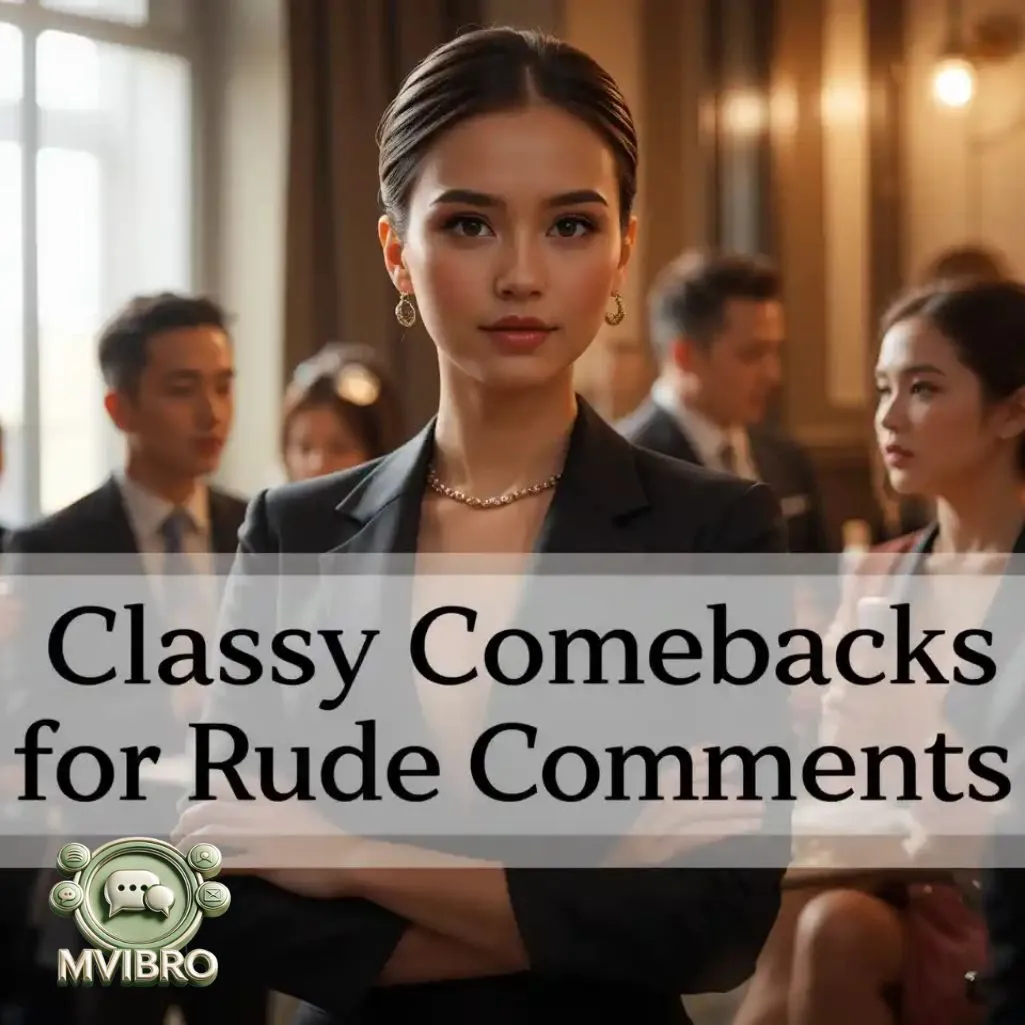When faced with rude comments, it’s easy to feel irritated or upset. But instead of reacting with meanness or nastiness, why not respond with funny and witty comebacks that show you’re in control? Don’t get mad, get clever!
This approach not only helps you stay calm but also turns a widespread problem into an opportunity for prudence and charm. By responding with intelligence, you can steer clear from trouble, maintain a positive atmosphere, and even leave others impressed.
In this guide, we’ll share 35+ creative replies to help you tackle churlish sources with confidence and ease, turning every encounter into a chance to shine. Whether it’s a colleague, a friend, or a stranger, you’ll be prepared with responses that keep the conversation lighthearted and in control.
Remember, there’s no one size fits all approach, so use these with discretion and only to poke fun not to spread more mean-spirited energy in the world!
Witty Responses to Rude Comments
Sometimes, a smart and witty response can turn a rude comment into a chance to showcase your quick thinking. These clever replies help you keep your cool and maintain control of the situation.
- “Thank you for your opinion, it really brightened my day.”
A sarcastic yet lighthearted way to acknowledge the rudeness without escalating things.
Example: “I’ll keep that in mind, thanks for sharing.”
This response lets the rude comment slide while subtly showing it didn’t bother you.
It’s both playful and disarming, keeping things calm. - “I’m sorry, I didn’t realize you were such an expert on my life.”
A sharp yet non-confrontational reply that puts the focus back on the other person’s overstepping.
Example: “Wow, I didn’t know you knew me so well!”
This response highlights their judgmental comment without causing a confrontation.
It shows confidence and redirects the conversation in a humorous way.
Polite Comebacks for Rude Remarks
Polite comebacks are a great way to maintain respect while still standing your ground. These responses show you’re calm, confident, and not easily rattled by rude remarks.
- “I appreciate your concern, but I’m confident in my choices.”
This reply politely shuts down the comment while expressing your confidence in your decisions.
Example: “I’m good with where I stand, but thanks for your input.”
It maintains your boundaries while acknowledging their comment in a respectful manner.
This type of response helps keep the conversation respectful without backing down. - “Let’s agree to disagree.”
A simple and respectful way to end a disagreement without tension.
Example: “We both have our own views, so let’s leave it at that.”
This response closes the conversation on a neutral note, allowing both sides to move on peacefully.
It’s a calm, confident way to handle any rude remark without escalating things further.
Clever Retorts to Offensive Comments
Clever retorts are great for turning an offensive comment into a humorous moment while maintaining your composure. These witty replies deflect the insult while keeping the conversation light.
- “I didn’t realize being rude was a skill.”
A sharp, but non-hostile way to point out the offensiveness without escalating things.
Example: “Well, you’ve certainly perfected that!”
This response allows you to point out the rudeness while still staying above the situation.
It also adds a layer of humor, leaving the rude commentor without a strong reply. - “Wow, you must be fun at parties.”
A playful response that challenges the negativity in a way that’s both light and funny.
Example: “I’m sure everyone loves hanging out with you.”
It turns the rudeness into a joke, suggesting their comment might not be the most pleasant.
The remark is harmless but shows that you’re not fazed by their attitude.
Smart Replies to Insults

Smart replies offer a quick way to deflect insults while maintaining your dignity. These responses allow you to rise above negativity with grace and confidence.
- “I hope your day gets better.”
A polite and kind way to diffuse the insult, shifting the conversation toward positivity.
Example: “I’m sure things will look up for you soon!”
This response subtly suggests that their negativity may be a reflection of a bad day, not your behavior.
It shows maturity and kindness while staying above the insult. - “Thanks for sharing that.”
A neutral response that acknowledges the insult without giving it power.
Example: “Interesting perspective, thanks for that.”
It lightly accepts the insult but doesn’t react emotionally.
This response helps maintain a calm demeanor without feeding into the negativity.
Read Also: Flirty Replies to ‘I’m Tired’ That Spark Romance
Humorous Responses to Rudeness
Humor is a powerful tool for deflecting rudeness and lightening the mood. A well-timed humorous response can turn an uncomfortable moment into a funny one.
- “Is it opposite day already?”
A funny and quirky way to point out how offbeat the rude comment is.
Example: “I didn’t realize we were swapping roles today!”
This response plays on the absurdity of the rude comment and disarms the situation.
It adds humor to the exchange and shifts the tone toward something playful. - “Did you mean to say that out loud?”
A humorous way to express surprise at the rudeness while keeping things light.
Example: “I didn’t know you were that bold!”
It highlights the rudeness in a non-confrontational way while still holding your ground.
This response uses humor to suggest the comment was more surprising than offensive.
Sarcastic Responses to Rude People
Sarcasm is perfect for when you want to show you’re unbothered and not taking the rude comment seriously. These responses let you express disinterest in a clever way.
- “Oh, I didn’t realize you were the boss.”
A sarcastic remark that shows you’re not controlled by the other person’s opinion.
Example: “Did I miss the memo where you became in charge?”
This response lightly mocks the rude comment, highlighting its irrelevance to your actions.
It keeps the tone light but makes it clear that you’re not going to be pushed around. - “Your approval is not needed, but thanks for sharing.”
A sharp but sarcastic way to dismiss an unnecessary comment.
Example: “I’ll take it under consideration, but I’m good.”
It lets the other person know that their opinion isn’t necessary but acknowledges them with irony.
The sarcastic tone cuts through the rudeness without causing any real confrontation.
Intelligent Comebacks for Mean Comments
Intelligent comebacks allow you to stay composed while responding with insight and wit. These responses demonstrate your ability to stay calm and thoughtful, even when faced with mean comments.
- “It’s interesting that you think that.”
A response that shows you’re listening but also questions the validity of the comment.
Example: “I never thought about it that way, that’s one perspective.”
It politely acknowledges the mean comment but opens the door for more thoughtful conversation.
This response shows you’re not quick to judge but also don’t blindly accept negativity. - “I’ll consider that.”
A calm and collected way to show you’re not fazed, while still leaving room for reflection.
Example: “I’ll think about your words, thanks for the input.”
This response is thoughtful and respectful, suggesting you’re not immediately reacting to the insult.
It allows you to gracefully dismiss the comment while still being considerate.
Calm and Collected Replies to Rude Remarks
When confronted with rude remarks, staying calm is key. These replies allow you to acknowledge the comment without letting it affect your composure.
- “I hear you.”
A simple yet effective response that shows you’re listening without reacting emotionally.
Example: “I understand what you’re saying.”
This reply gives you the opportunity to stay calm and control the flow of the conversation.
It demonstrates your ability to listen without escalating the situation. - “We can discuss this later.”
A polite way to postpone the conversation without letting it turn into an argument.
Example: “This isn’t the best time, let’s chat about it soon.”
This response gracefully defers the issue without igniting further tension.
It gives you the space to handle things on your own terms when you’re ready.
Graceful Responses to Unkind Words
Responding with grace to unkind words shows maturity and helps to defuse negativity. These replies allow you to stay composed and focus on the positive.
- “Let’s focus on the positive.”
A gentle nudge to shift the conversation away from negativity and toward a more constructive direction.
Example: “There’s always a brighter side, let’s talk about that.”
This response helps to reframe the conversation without shutting down the other person.
It encourages a more optimistic approach and fosters a peaceful environment. - “I believe in constructive feedback.”
A calm way to steer the conversation toward productive criticism rather than destructive comments.
Example: “I’d love to hear your thoughts on how I can improve.”
This reply conveys your openness to improvement while subtly redirecting the conversation to a more positive space.
It shows your maturity and willingness to learn without tolerating harsh remarks.
Classy Comebacks for Rude Comments

A classy comeback not only deflects rudeness but also shows your sophistication and poise. These responses maintain respect and dignity in any situation.
- “I’m sure you didn’t mean that in a bad way.”
A classy way to acknowledge the comment without escalating its negativity.
Example: “I’m sure it wasn’t your intention to upset me.”
This response maintains politeness and diffuses tension by assuming the best of the other person’s intentions.
It allows you to remain respectful while addressing the comment in a graceful manner. - “Let’s keep things respectful.”
A direct yet respectful way to set boundaries in the conversation.
Example: “Let’s have a constructive conversation, please.”
This reply subtly reminds the other person of the need for civility.
It helps maintain control of the conversation and ensures that the tone stays respectful.
Creative Retorts to Rude Behavior
Creative retorts add a layer of wit and originality to your response. These replies allow you to turn a rude comment into an opportunity for cleverness.
- “Your honesty is refreshing.”
A creative way to turn a rude remark into a compliment, showing that you’re unbothered by the comment.
Example: “I didn’t expect such a straightforward answer, but it’s interesting.”
This reply puts a positive spin on the negativity, showing that you’re not phased by it.
It adds humor and shows that you can handle rudeness with grace. - “I prefer to focus on solutions.”
A constructive way to redirect the conversation from rude behavior to something more productive.
Example: “Instead of dwelling on the problem, let’s find a way to fix it.”
This response shifts the focus to problem-solving rather than continuing the negativity.
It positions you as someone who is proactive and solution-oriented.
Subtle Yet Sharp Replies to Insults
Subtle yet sharp replies are perfect for handling insults with finesse. These responses convey a sense of maturity while still addressing the rudeness.
- “That’s an interesting perspective.”
A polite but pointed way to acknowledge an insult without agreeing with it.
Example: “I never thought about it that way, thanks for sharing.”
This response doesn’t directly engage with the insult but subtly calls attention to its oddity.
It keeps the conversation calm and allows you to distance yourself from the negativity. - “I’ll take that under advisement.”
A calm, collected response that dismisses the insult while maintaining professionalism.
Example: “I’ll consider that, thank you for your feedback.”
This response allows you to acknowledge the comment without giving it power or escalating things.
It signals that you’re not overly affected and gives you time to process before reacting.
Diplomatic Responses to Rudeness
Diplomatic responses help defuse tension while maintaining a polite and respectful tone. These replies can turn a negative exchange into a more neutral one.
- “I value your input.”
A respectful way to acknowledge someone’s comment while distancing yourself from the negativity.
Example: “I appreciate you sharing that, though I may have a different view.”
This reply maintains respect while letting the other person know their rudeness isn’t going unnoticed.
It helps shift the focus toward respectful discourse and minimizes further tension. - “Let’s find a constructive way to discuss this.”
A diplomatic way to steer the conversation toward a more positive and productive direction.
Example: “I think we can both get more out of this discussion if we stay focused on solutions.”
This response encourages mutual respect and refocuses the conversation on problem-solving.
It avoids confrontation while promoting a constructive dialogue.
Quick-Witted Comebacks for Rude Remarks
Quick-witted comebacks can deflect rudeness in an instant. These sharp responses show that you’re unbothered and confident in handling insults.
- “Is that the best you’ve got?”
A clever response that challenges the rudeness and takes the wind out of the commenter’s sails.
Example: “I’m sure you can do better than that!”
This reply is lighthearted but cuts through the insult, signaling that you’re not easily rattled.
It shifts the tone of the conversation and shows you’re not bothered by petty remarks. - “I’ve heard better insults from five-year-olds.”
A humorous yet sharp way to dismiss an insult by downplaying its significance.
Example: “That’s a creative attempt, but I’ve heard better comebacks in kindergarten!”
This response is playful and shows that you’re not intimidated by the insult.
It uses humor to deflect the rudeness while keeping the atmosphere light.
Professional Replies to Rude Comments
Professional replies help keep things cordial, especially in work or formal settings. These responses help you maintain your authority and composure.
- “Let’s keep this professional.”
A firm but polite way to set boundaries and remind the other person of the appropriate behavior.
Example: “Let’s stay focused on the matter at hand, please.”
This response ensures the conversation stays respectful and professional.
It redirects the dialogue to a more constructive tone and minimizes unnecessary conflict.
- “I’m here to discuss solutions, not problems.”
A professional way to deflect the negativity and keep the conversation productive.
Example: “I’m more interested in how we can resolve this, not dwell on issues.”
This response focuses the conversation on actionable steps instead of allowing the rudeness to take center stage.
It reinforces your goal of maintaining a solution-oriented approach.
Key Insight
1. Why is it important to respond cleverly to rude comments?
Responding cleverly allows you to defuse tension without escalating the situation, while also maintaining control and dignity.
2. How can witty responses change the tone of a conversation?
Witty responses add humor and show confidence, shifting the conversation away from negativity and promoting a more lighthearted atmosphere.
3. What should I avoid when responding to rude comments?
Avoid aggressive or sarcastic remarks that may fuel the negativity. Instead, focus on staying calm, respectful, and composed.
4. Can a diplomatic response be more effective than a witty comeback?
Yes, diplomatic responses are ideal when you want to keep the conversation respectful and professional, especially in formal settings.
5. How do I remain confident while dealing with rude comments?
Focus on keeping your emotions in check and respond with respect, knowing that you control how the conversation unfolds.
Conclusion
Responding to rude comments with clever, calm, and witty replies not only helps defuse tension but also elevates your communication skills. Instead of reacting impulsively, these smart responses allow you to maintain control of the conversation and steer it in a more positive direction.
When it’s a witty comeback or a diplomatic reply, the key is to stay composed and confident. By choosing thoughtful, respectful responses, you can navigate even the most challenging situations with grace.
Remember, it’s not just about shutting down rudeness, but about demonstrating your maturity and ability to remain unshaken by negativity.

Hi! I’m Ethan Matthews, the admin of mvibro.com, dedicated to bringing you the best responses and comebacks to navigate conversations with style and confidence.

